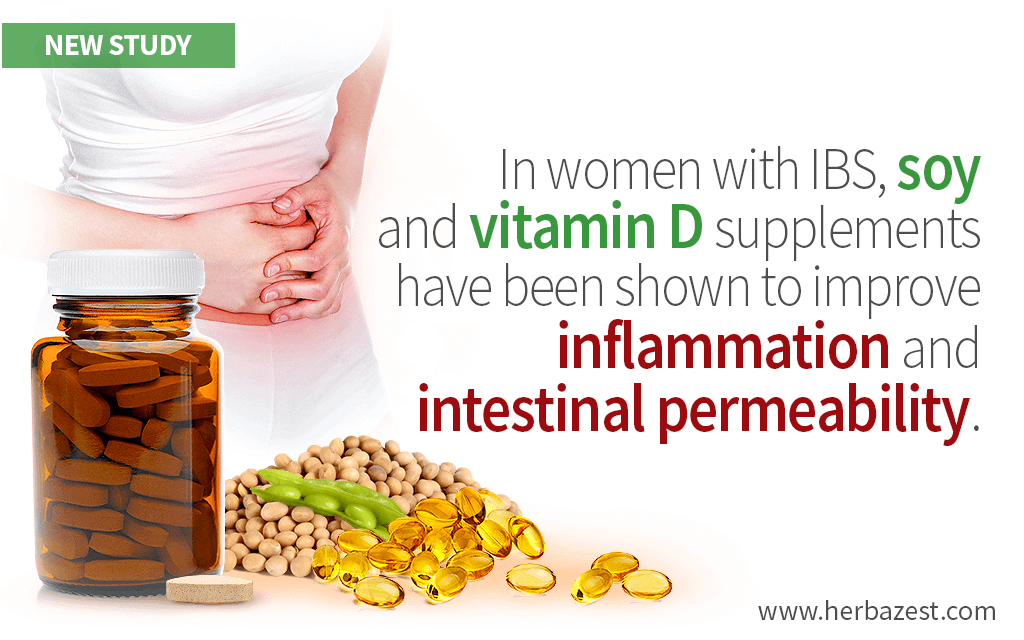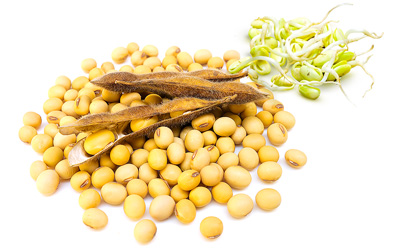Irritable bowel syndrome (IBS) is a highly debilitating condition, whose causes are largely unknown. Some of the suspected triggers include low-grade inflammation and oxidative stress, yet researchers are exploring how circulating estrogen may play a role in IBS and gastrointestinal function in general.1
Several phytoestrogenic compounds in soy, particularly daidzein and genistein, have been previously tested in in vitro studies and shown to inhibit inflammatory markers.2 Vitamin D, on the other hand, has been found to reduce the severity of IBS symptoms and improve the quality of life of its sufferers.3
The aim of this trial was to explore the effects of soy and vitamin D on IBS in women.
The Study
This randomized clinical trial took place at the Gastrointestinal Disorders Research Institute at the Tehran University of Medical Sciences (Tehran, Iran). Researchers published their results in the 2019 edition of the Clinical Nutrition ESPEN journal.
There were 100 women with IBS recruited for this study, aged 18 to 75. Once they were randomly allocated into four study groups, they received their treatments for six weeks as follows:
- Group 1: Soy + vitamin D placebo
- Group 2: Vitamin D + soy placebo
- Group 3: Soy + vitamin D
- Group 4: Soy placebo + vitamin D placebo
Soy isoflavones supplements containing 10 mg daidzein, 8.5 mg genistein, and 1.5 mg glycetin were taken twice daily. Vitamin D supplements consisting of 50,000 IU of active cholecalciferol were taken once every 14 days. The placebo pills were made from 10 mg of cornstarch or 10 mg of triglyceride oil.
Plasma inflammatory markers, antioxidant status, fetal protease activity, and other markers were measured at week 0 and 6.
The Results
At the completion of the study period, all groups, except for the placebo, showed significantly reduced plasma inflammatory markers and fecal protease activity.
No improvements in antioxidant status were observed. Participants did not report any side effects.
What Does this Mean?
As evident in the study, supplementation with soy and vitamin D may benefit IBS sufferers, particularly in terms of inflammation levels and intestinal permeability. These beneficial effects are much more pronounced when both supplements are taken, although soy and vitamin D alone can also bring significant improvements.
This was the first clinical trial investigating the effects of soy and vitamin D supplementation on IBS parameters in women. Researchers suggest additional studies to further explore the efficacy of these supplements.
Other IBS-friendly herbs include peppermint, turmeric, anise, and oats.
Sources
- Clinical Nutrition ESPEN, Soy isoflavones and cholecalciferol reduce inflammation, and gut permeability, without any effect on antioxidant capacity in irritable bowel syndrome: A randomized clinical trial, 2019
Footnotes:
- World Journal of Gastroenterology. (2014). Sex hormones in the modulation of irritable bowel syndrome. Retrieved September 23, 2020 from https://pubmed.ncbi.nlm.nih.gov/24627581/
- Phytochemistry. (2003). Soybean isoflavones inhibit tumor necrosis factor-alpha-induced apoptosis and the production if interleukin-6 and prostaglandin E2 in osteoblastic cells. Retrieved September 23, 2020 from https://pubmed.ncbi.nlm.nih.gov/12711143/
- International Journal of Preventive Medicine. (2019). Effects of Vitamin D Supplementation in Patients with Irritable Bowel Syndrome: A Randomized, Double-Blind, Placebo-Controlled Clinical Trial. Retrieved September 23, 2020 from https://www.ncbi.nlm.nih.gov/pmc/articles/PMC6390425/





